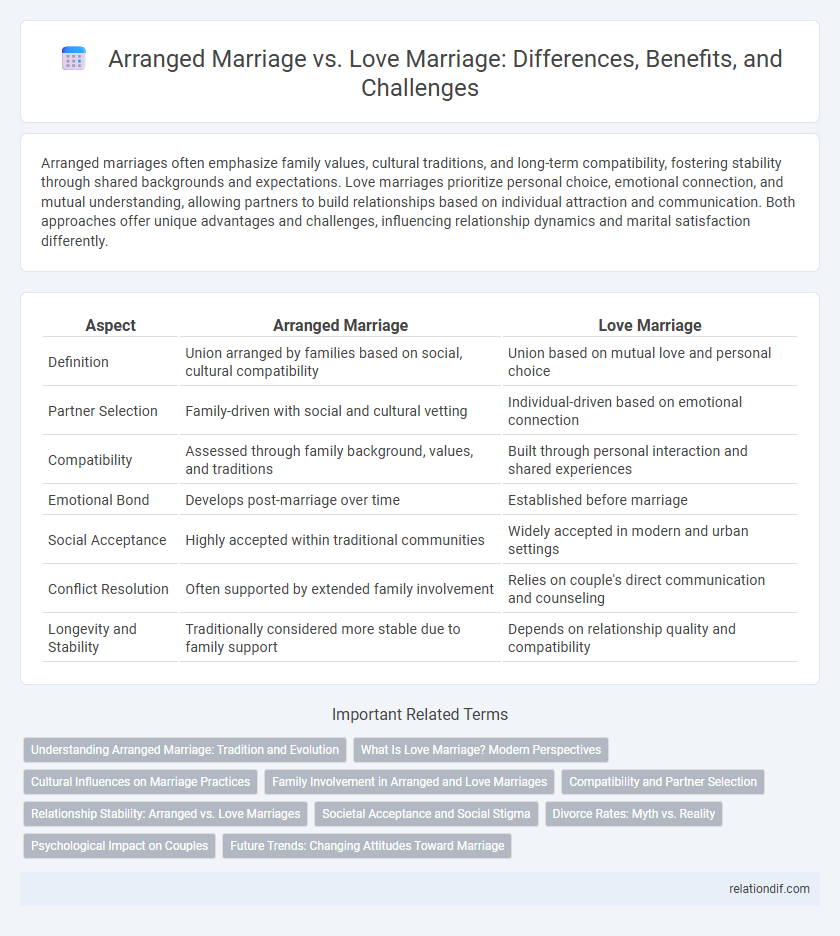Arranged marriages often emphasize family values, cultural traditions, and long-term compatibility, fostering stability through shared backgrounds and expectations. Love marriages prioritize personal choice, emotional connection, and mutual understanding, allowing partners to build relationships based on individual attraction and communication. Both approaches offer unique advantages and challenges, influencing relationship dynamics and marital satisfaction differently.
Table of Comparison
| Aspect | Arranged Marriage | Love Marriage |
|---|---|---|
| Definition | Union arranged by families based on social, cultural compatibility | Union based on mutual love and personal choice |
| Partner Selection | Family-driven with social and cultural vetting | Individual-driven based on emotional connection |
| Compatibility | Assessed through family background, values, and traditions | Built through personal interaction and shared experiences |
| Emotional Bond | Develops post-marriage over time | Established before marriage |
| Social Acceptance | Highly accepted within traditional communities | Widely accepted in modern and urban settings |
| Conflict Resolution | Often supported by extended family involvement | Relies on couple's direct communication and counseling |
| Longevity and Stability | Traditionally considered more stable due to family support | Depends on relationship quality and compatibility |
Understanding Arranged Marriage: Tradition and Evolution
Arranged marriage, rooted in centuries-old cultural traditions, continues to evolve by integrating modern values such as individual choice and mutual respect. Families facilitate these unions by carefully selecting compatible partners based on social, economic, and cultural factors, ensuring stability and shared expectations. This blend of tradition and adaptation fosters lasting relationships that honor heritage while embracing contemporary dynamics.
What Is Love Marriage? Modern Perspectives
Love marriage refers to a union where individuals choose their partners based on mutual affection, emotional connection, and compatibility rather than family mediation. Modern perspectives emphasize personal freedom, individual rights, and emotional fulfillment as key factors driving love marriages in contemporary society. This approach often challenges traditional norms by prioritizing personal choice and romantic involvement over social or familial obligations.
Cultural Influences on Marriage Practices
Arranged marriages often reflect deep-rooted cultural traditions emphasizing family involvement, social alliances, and community values, while love marriages prioritize individual choice and emotional connection. In many cultures, arranged marriages serve as a means to preserve heritage, ensure social compatibility, and maintain economic stability across generations. As societies modernize, the interplay between cultural expectations and personal freedom continues to shape evolving marriage practices worldwide.
Family Involvement in Arranged and Love Marriages
Family involvement in arranged marriages traditionally plays a central role, with elders actively participating in partner selection, reflecting cultural values and ensuring social compatibility. In contrast, love marriages typically emerge from individual choice, with families often taking a more passive or supportive role after the couple has decided to marry. This difference impacts family dynamics, social expectations, and the negotiation of familial bonds within the marriage.
Compatibility and Partner Selection
Compatibility plays a crucial role in both arranged and love marriages, with arranged marriages often relying on family insights and cultural alignment to ensure partner suitability. Love marriages prioritize personal connection and emotional understanding, which can enhance compatibility through shared experiences before commitment. Effective partner selection in either system depends on mutual respect, aligned values, and long-term goals to foster a stable and fulfilling relationship.
Relationship Stability: Arranged vs. Love Marriages
Arranged marriages often benefit from strong familial support and shared cultural values, contributing to higher relationship stability over time. Love marriages, while based on personal choice and emotional connection, may face challenges related to compatibility and external pressures without the same level of family involvement. Studies indicate that couples in arranged marriages report lower divorce rates and greater long-term commitment compared to those in love marriages.
Societal Acceptance and Social Stigma
Arranged marriages often receive stronger societal acceptance in traditional communities due to established family involvement and cultural alignment, which reduces social stigma. Love marriages, while increasingly accepted in urban and liberal areas, may still face resistance and social scrutiny in conservative societies that prioritize family approval and social conformity. Social stigma around love marriages typically stems from challenging entrenched norms, impacting couples' social relationships and community integration.
Divorce Rates: Myth vs. Reality
Divorce rates in arranged marriages are often perceived as lower due to familial and societal pressures, but empirical studies reveal that love marriages do not necessarily have higher divorce risks when factors like age and education are controlled. Research from the National Center for Family & Marriage Research indicates that compatibility and communication skills significantly impact marital stability beyond the mode of partner selection. This challenges myths by highlighting that the quality of the relationship is a stronger predictor of divorce rates than whether the marriage was arranged or initiated by love.
Psychological Impact on Couples
Arranged marriages often provide couples with strong family support and clear expectations, which can contribute to lower initial anxiety and stress levels. Love marriages, while based on mutual choice and romantic attachment, may encounter higher psychological challenges due to unrealistic expectations and social pressures. Both types of marriages require effective communication and emotional intelligence to foster long-term psychological well-being and relationship satisfaction.
Future Trends: Changing Attitudes Toward Marriage
Future trends in marriage reflect a significant shift toward personal choice over traditional arrangements, with increasing acceptance of love marriages globally. Studies show younger generations prioritize emotional compatibility and individual fulfillment, leading to a decline in purely arranged marriages. Research from cultural sociologists highlights that hybrid models combining family involvement and personal autonomy are emerging as popular alternatives.
arranged marriage vs love marriage Infographic

 relationdif.com
relationdif.com